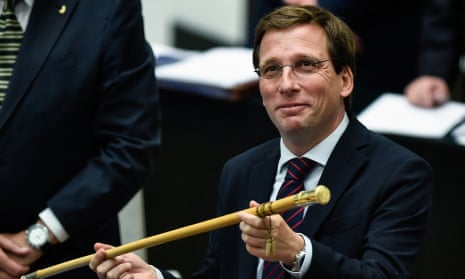Madrid’s city council has swung sharply to the right after the conservative People’s party (PP) and the centre-right Citizens party enlisted the controversial support of the far-right Vox to take control of the Spanish capital.
On Saturday morning, three weeks after local and regional elections were held, the PP’s José Luis Martínez-Almeida was sworn in as mayor, with Citizens’ Begoña Villacís as his deputy.
Martínez-Almeida succeeds Manuela Carmena, a leftwing former judge whose four-year stint as mayor was marked by a commitment to diversity and the environment.
The new mayor shrugged off criticism of his party’s decision to work with Vox, challenging anyone “to find anything that lies outside the legal order” in his deals.
But he also promised to serve all the people of Madrid.
“Between us, we will build Madrid,” said Martínez-Almeida. “We won’t leave behind those who want a more open Madrid. We want to write the future and not remember the past.”
Carmena congratulated her successor and reminded him of the importance of both feminism and democracy.
“We need to look after democracy because we know what it cost to bring democracy to this country,” she said. “It took so much, such an effort and so many lives that we cannot forget it.”
The PP has signalled that one of its first acts in office will be rethinking and possibly scrapping Carmena’s urban low emissions zone, known as Madrid Central.
Both the PP and Citizens have shifted further to the right over recent months in the hope of stopping their voters drifting towards Vox, whose tough line on Catalan independence, anti-immigration stance and tirades against feminism have attracted some traditional PP supporters.
Citizens was subjected to fierce criticism last December after it cut a similar deal with Vox to govern the southern region of Andalucía.
Earlier this week, the French government explicitly warned Citizens – which is part of the new liberal group in the European parliament led by Emmanuel Macron – that any further cosying up to the far right would have consequences.
On Friday, France’s secretary of state for European affairs, Amélie de Montchalin, expressed “grave concerns” over such deals, adding: “We think that an alliance with the far right, like we have seen in Spain, is not an option.”
France’s intervention led Vox to urge Spain’s acting prime minister, Pedro Sánchez, to “defend Spaniards’ independence” in the face of “unacceptable” interference.
The former French prime minister Manuel Valls, who staged an unsuccessful bid to become the mayor of Barcelona in last month’s election, has also repeatedly warned his Citizens allies not to collaborate with Vox and called for a cordon sanitaire against the far right.
Valls, who campaigned on a staunchly unionist platform, has thrown his weight behind Ada Colau, the leftwing mayor of Barcelona, who secured a second term in the Catalan capital in a vote on Saturday afternoon.
The pro-independence Catalan Republican Left party won marginally more votes than Colau’s group, but Colau retained office after reaching an agreement with the Catalan branch of the socialist party and Valls’ councillors.
Her election drew an angry response from some Catalan secessionists, who gathered in central Barcelona to protest and to chant, “Colau és un frau!” (“Colau is a fraud!”).
The wealthy northeastern region is governed by pro-independence parties. Although Citizens won the most seats and the largest share of the vote in the last regional election in December 2017, it could not assemble a governing coalition.
The focus will now be on Sánchez’s efforts to form a national government.
While his Spanish Socialist Workers’ party finished first in the general election at the end of April, it fell well short of a majority in the congress of deputies.
Sánchez has agreed to cooperate with the anti-austerity Podemos party to work towards building a government, but has ruled out a coalition deal. He has also raised the possibility of holding another general election if his efforts to resume office are thwarted in parliament.
Another vote – which would be Spain’s fourth in under four years – would favour the socialists as it would hurt Podemos and see the three rightwing parties in renewed competition for votes.










